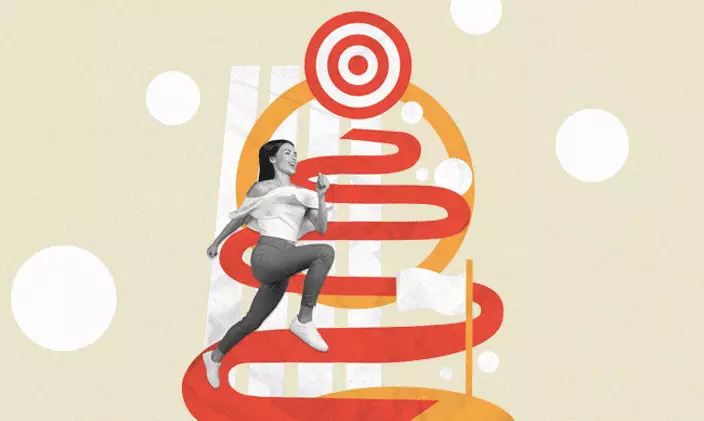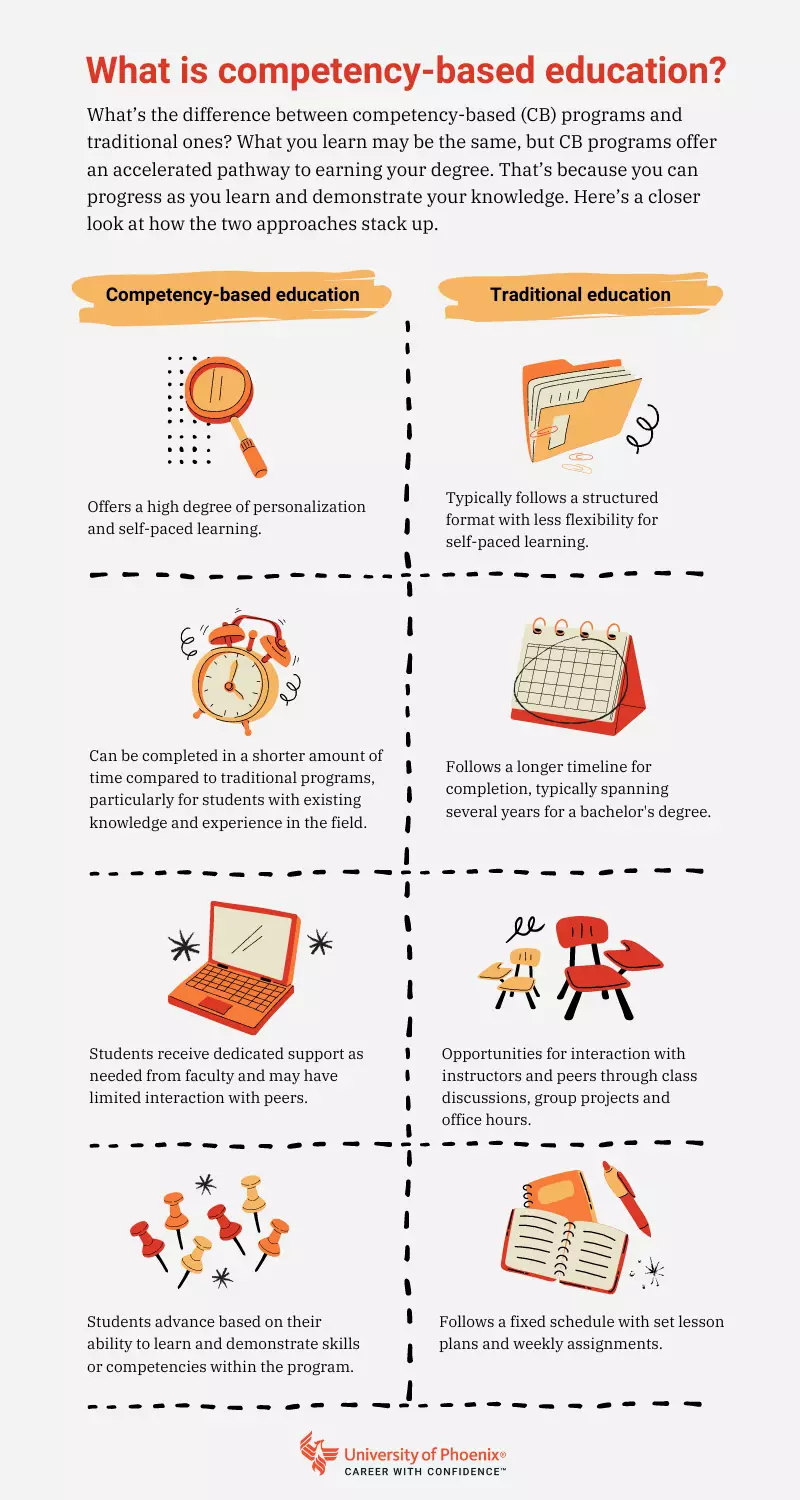Understanding competency-based (CB) education
This article was updated on March 26, 2024.

Written by Elizabeth Exline

Reviewed by Marc Booker, PhD, Vice Provost, Strategy

In today’s world, doing things faster is almost always attractive, even in education. With competency-based (CB) degree programs, students can do just that. Credit-based CB degree programs at University of Phoenix provide an expedited pathway to learning new career skills and earning a degree.
How? In a number of ways. First, CB programs are designed for students who already have strong foundational knowledge in their field. This knowledge allows them to demonstrate their skill through a competency assessment (more on that below) or learn and progress through the course material faster. When you’re already familiar with something, after all, it’s easier to build on that knowledge.
CB degree programs at UOPX are also structured differently from standard online degree programs. Students in CB degree programs can generally take up to four classes concurrently in a 16-week period, for example, as opposed to taking one 5- or 6-week course at a time.
In these ways, CB degree programs at UOPX complement the standard online degree programs as a time-saving option that certain working adults might favor. Both options underscore flexibility and career-relevant skills, but CB degree programs at UOPX deliver the same learning outcomes at a faster rate of consumption. Accordingly, they’re best suited to students who have experience in their industry, strong time management skills and the discipline to meet deadlines that the student has set with the support of faculty members.
What is competency-based education?
Generally speaking, competency-based education is an approach to learning that emphasizes autonomy, speed and personalization as a student demonstrates competency in a subject area.
The nuances of CB degree programs vary by institution. At UOPX, for example, students collaborate with instructors to determine a timeline for learning course content and completing competency assessments. This approach affords students a certain level of control over their program experience, but it means that discipline and time management skills are essential if they are to complete their program on time.
Because CB degree programs lean toward professionals with ample experience in a given field, they tend to emphasize real-world skills over abstract theories or philosophies. Students should already have a strong grasp of the concepts behind the skills they’re learning (whether from work or from school) so they can instead focus on acquiring skills they don’t already have.
How do competency-based degree programs work at UOPX?
Students who enroll in a CB degree program must already have experience (academic and professional) in their field of study. As noted, CB degree programs allow students to take up to four courses concurrently per 16-week period, as opposed to one course every five to six weeks. To take advantage of the accelerated structure for this program, students must take at least three classes at a time, but four is recommended.
Once accepted into a CB degree program, students are assigned a faculty mentor who is credentialed to teach a class in that field but whose primary task is to support the student across all of the classes they are enrolled in and help them stay on pace to meet class deliverables.
The faculty mentor is therefore positioned to make useful recommendations, such as how to approach content across courses if certain topics complement each other.
Keeping students on track with their program so they don’t fall behind is another vital task for faculty mentors, since the flexible nature of the courses opens up students to the possibility for procrastination.
In addition to faculty mentors, students work with practitioner faculty in each course to learn material and submit their competency assessments for evaluation. The practitioner faculty is the content expert for the course the student is enrolled in and will be the person evaluating whether the student is competent in a course learning outcome.
While CB degree programs are structured to ensure students can complete their program faster than they would in a standard online degree program, they do require students to participate in regular check-ins and activities with their faculty members so that they stay engaged throughout the entire program.
Finishing a credit-based CB course prior to the scheduled course end date, in other words, isn’t really feasible. Students can, however, collaborate with their instructors to schedule competency assessments on a customized timeline. Students can also reach out to instructors with questions about the course content, which takes a variety of forms including reading, quizzes and video lectures.
Each course generally teaches three competencies or learning outcomes. At UOPX, each competency is tied to one credit, one skill and one learning outcome. While the assessments themselves can vary in nature, each competency assessment must be successfully completed for a student to finish the course.
Students can resubmit a competency assessment up to three times if they fail to successfully complete it, but time is precious in a CB degree program. It’s important to focus on submitting the best possible product the first time.
Finally, CB degree programs at UOPX do not administer traditional letter grades. Instead, students are evaluated as mastering, meeting or not meeting the requirements of a competency.
Competency-based education vs. traditional education
Where CB degree program assessments focus on skills and competencies to demonstrate learning, traditional higher education assessments often take a broader approach to focusing on theory. Whether in-person or through an online degree program, traditional education often instructs students about foundational theories, concepts and philosophies as a gateway to apply practical, real-world skills.
CB degree programs, on the other hand, utilize instructors as veritable “co-pilots” in the learning experience, notes Marc Booker, the vice provost of strategy at UOPX. Where instructors in a traditional or standard online degree program might teach the whole class the same thing at the same time, instructors in a CB degree program can tailor the experience on a more individual basis to a student’s unique skill set, pointing to where they need to focus on learning more. In this way, a CB degree program is personalized to what each student needs to acquire career-relevant skills.
CB degree programs also rely less on peer-to-peer student interactions in the classroom and more on interactions with individuals in the field for the completion of assessments. A student in an MBA–CB program, for example, may be tasked with talking to co-workers and management about organizational structure in order to complete a competency assessment on organizational design.
Ultimately, CB degree programs offer tailored instruction in less time and for less money than traditional degree programs, but they’re not for everyone. Students who have professional experience with (but not a specific credential in) the discipline and want to prioritize an intense educational experience are ideally suited to CB degree programs.
Benefits of competency-based education programs
CB education programs may be faster and more personalized, but they also require a lot of effort and discipline from the student. So, why would someone choose it over a standard degree program? Because of the following benefits:
1. Real-world application: In a standard degree program, you might theorize about a concept or procedure. In a CB degree program, you identify the real-world context. For example, Booker says, you might write a paper about what a SWOT analysis is and how it may apply to organizations in a standard MBA program, but in a CB program a student would do a SWOT analysis on their own organization as part of a competency assessment.
2. More flexibility: In a standard degree program, the instructor sets the timeline for assignments and tests. In the CB program, you and your instructor collaborate to set due dates that align with your needs.
3. Lower cost: Because of the unique nature of the delivery model and the greater agency placed on the student, CB programs can be delivered at a lower cost. In fact, at UOPX, students can potentially complete a CB degree program for less money and more quickly than traditional degree programs. For example, the Master of Business Administration–CB is designed so it can be completed in under a year for less than $10,000.
Perhaps the most compelling advantage, however, is the one of saving time. As UOPX’s vice provost of colleges, Doris Savron, notes, people are busier than ever these days. They have family obligations, full-time jobs and sometimes responsibilities to their communities. Adult learners, she says, “don’t want to waste time or money doing work where they already have abilities. Students want to get right to the information and content they need and want to learn.”
In the context of a CB degree program, speed means students are poised to add significant value to their employers sooner.
Competency-based degree programs at University of Phoenix
As with its standard online degree programs, University of Phoenix approaches competency-based degree programs from the perspective of adult learners. What will make them most successful? What do they need? When it comes to education, sometimes those needs center on speed, skills and savings.
To that end, University of Phoenix currently offers four CB degree programs. They are:
- RN to Bachelor of Science in Nursing: This program is designed for working professionals who have an associate degree in nursing, an unencumbered RN license and one year of professional experience.
- Master of Business Administration: Business waits for no one. That’s why this program is designed for professionals who hold a business degree and have experience working in the field.
- Master of Health Administration: Ready to learn 36 key skills to help you impact your health organization? Then buckle up for this program, which is geared toward working professionals who hold a bachelor’s degree and have three years’ experience working in healthcare.
- Master of Information Systems: Ours is a digital world, and now is the time to shape it. This CB degree program is designed to help tech-minded professionals learn how to solve IT problems and impact the way businesses use technology.
Learn more about CB degree programs at University of Phoenix!

ABOUT THE AUTHOR
Elizabeth Exline has been telling stories ever since she won a writing contest in third grade. She's covered design and architecture, travel, lifestyle content and a host of other topics for national, regional, local and brand publications. Additionally, she's worked in content development for Marriott International and manuscript development for a variety of authors.

ABOUT THE REVIEWER
Dr. Marc Booker, University of Phoenix Vice Provost for Strategy, has more than two decades of experience working with online and distance education students at the post-secondary level. He currently oversees critical path academic initiatives to improve the student experience. Dr. Booker is a regular speaker, author and contributor to national higher education associations.
This article has been vetted by University of Phoenix's editorial advisory committee.
Read more about our editorial process.
Read more articles like this:


